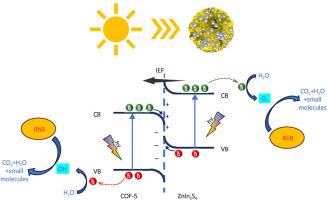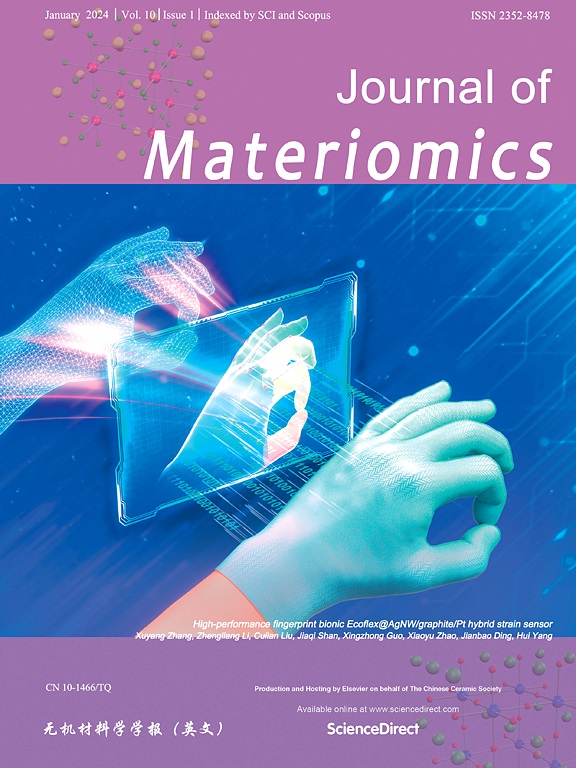In situ irradiated XPS investigation on S-scheme ZnIn2S4@COF-5 photocatalyst for enhanced photocatalytic degradation of RhB
IF 8.4
1区 材料科学
Q1 CHEMISTRY, PHYSICAL
引用次数: 0
Abstract
Recently, the step-scheme (S-scheme) heterojunction has gained significant attention due to its effective electron-hole separation and strong redox capabilities. However, reports on covalent organic framework (COF)-based S-scheme heterojunctions for photocatalytic RhB degradation remain limited. In this study, an S-scheme ZnIn2S4@COF-5 heterojunction photocatalyst was successfully synthesized by growing COF-5 on the surface of ZnIn2S4 nanosheets, achieving efficient RhB degradation. Using 30 mg of ZnIn2S4@COF-5, we degraded 50 mL of an 80×10-6 RhB solution, achieving a 97% removal rate within 90 min. The photocatalytic performance of the ZnIn2S4@COF-5 S-scheme heterojunction was approximately 1.7 times higher than that of ZnIn2S4 and 1.6 times higher than COF-5 alone. Compared to the other reported COF-based S-scheme heterojunctions and commercial photocatalysts, this ZnIn2S4@COF-5 photocatalyst exhibited superior photocatalytic performance. The S-scheme charge transfer mechanism of the ZnIn2S4@COF-5 heterojunction was elucidated through in situ irradiated XPS. Experimental results demonstrate that this rational design not only facilitates the effective separation of photogenerated electrons and holes, but also provides a large surface area and abundant active sites for efficient RhB degradation.


原位辐照 XPS 研究用于增强 RhB 光催化降解的 S 型 ZnIn2S4@COF-5 光催化剂
最近,阶梯梯型(S-scheme)异质结因其有效的电子-空穴分离和强大的氧化还原能力而备受关注。然而,有关基于共价有机框架(COF)的 S 型异质结用于光催化降解 RhB 的报道仍然有限。本研究通过在 ZnIn2S4 纳米片表面生长 COF-5 成功合成了一种 S 型 ZnIn2S4@COF-5 异质结光催化剂,实现了对 RhB 的高效降解。使用 30 毫克 COF-5@ ZnIn2S4,我们在 90 分钟内降解了 50 毫升 80 ppm 的 RhB 溶液,去除率达到 97%。COF-5@ ZnIn2S4 S 型异质结的光催化性能是 ZnIn2S4 的约 1.7 倍,是 COF-5 单体的 1.6 倍。与其他已报道的 COF 基 S-scheme异质结和商业光催化剂相比,这种 ZnIn2S4@COF-5 光催化剂表现出更优越的光催化性能。通过原位照射 XPS,阐明了 ZnIn2S4@COF-5 异质结的 S 型电荷转移机制。实验结果表明,这种合理的设计不仅有利于有效分离光生电子和空穴,还为高效降解 RhB 提供了较大的比表面积和丰富的活性位点。
本文章由计算机程序翻译,如有差异,请以英文原文为准。
求助全文
约1分钟内获得全文
求助全文
来源期刊

Journal of Materiomics
Materials Science-Metals and Alloys
CiteScore
14.30
自引率
6.40%
发文量
331
审稿时长
37 days
期刊介绍:
The Journal of Materiomics is a peer-reviewed open-access journal that aims to serve as a forum for the continuous dissemination of research within the field of materials science. It particularly emphasizes systematic studies on the relationships between composition, processing, structure, property, and performance of advanced materials. The journal is supported by the Chinese Ceramic Society and is indexed in SCIE and Scopus. It is commonly referred to as J Materiomics.
 求助内容:
求助内容: 应助结果提醒方式:
应助结果提醒方式:


